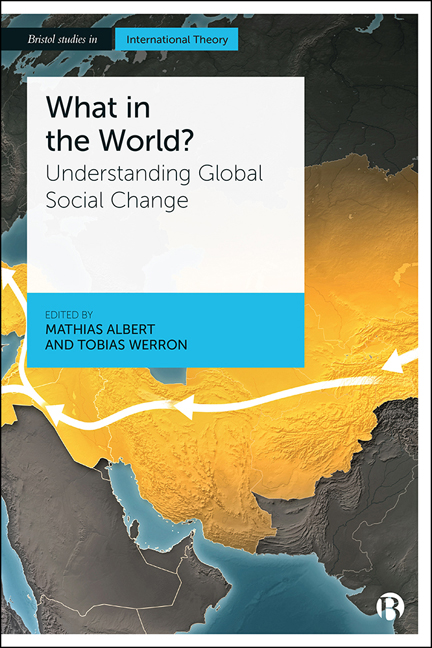Book contents
- Frontmatter
- Contents
- List of Figures and Tables
- Notes on Contributors
- Acknowledgements
- 1 Introduction: World Society and Its Histories – The Sociology and Global History of Global Social Change
- 2 Every Epoch, Time Frame or Date that Is Solid Melts into Air. Does It? The Entanglements of Global History and World Society
- 3 Periodization in Global History: The Productive Power of Comparing
- 4 Communication, Differentiation and the Evolution of World Society
- 5 Field Theory and Global Transformations in the Long Twentieth Century
- 6 Organization(s) of the World
- 7 Particularly Universal Encounters: Ethnographic Explorations into a Laboratory of World Society
- 8 From the First Sino-Roman War (That Never Happened) to Modern International-cum-Imperial Relations: Observing International Politics from an Evolution Theory Perspective
- 9 Nationalism as a Global Institution: A Historical-Sociological View
- 10 States and Markets: A Global Historical Sociology of Capitalist Governance
- 11 The Impact of Communications in Global History
- 12 The ‘Long Twentieth Century’ and the Making of World Trade Law
- 13 Third-Party Actors, Transparency and Global Military Affairs
- 14 Technical Internationalism and Global Social Change: A Critical Look at the Historiography of the United Nations
- References
- Index
14 - Technical Internationalism and Global Social Change: A Critical Look at the Historiography of the United Nations
Published online by Cambridge University Press: 22 December 2021
- Frontmatter
- Contents
- List of Figures and Tables
- Notes on Contributors
- Acknowledgements
- 1 Introduction: World Society and Its Histories – The Sociology and Global History of Global Social Change
- 2 Every Epoch, Time Frame or Date that Is Solid Melts into Air. Does It? The Entanglements of Global History and World Society
- 3 Periodization in Global History: The Productive Power of Comparing
- 4 Communication, Differentiation and the Evolution of World Society
- 5 Field Theory and Global Transformations in the Long Twentieth Century
- 6 Organization(s) of the World
- 7 Particularly Universal Encounters: Ethnographic Explorations into a Laboratory of World Society
- 8 From the First Sino-Roman War (That Never Happened) to Modern International-cum-Imperial Relations: Observing International Politics from an Evolution Theory Perspective
- 9 Nationalism as a Global Institution: A Historical-Sociological View
- 10 States and Markets: A Global Historical Sociology of Capitalist Governance
- 11 The Impact of Communications in Global History
- 12 The ‘Long Twentieth Century’ and the Making of World Trade Law
- 13 Third-Party Actors, Transparency and Global Military Affairs
- 14 Technical Internationalism and Global Social Change: A Critical Look at the Historiography of the United Nations
- References
- Index
Summary
Introduction
Historians who account for global social change stand in a somewhat peculiar tradition that approaches the past of international organizations through national lenses. There is a predominant narrative that goes back to Immanuel Kant's short essay on ‘Perpetual Peace’ (Kant, 1977), and by and large the lead question in historiographical scholarship is: to what extent was Kant's vision realized in global politics? This chapter, by contrast, ventures into the technical basis of global sociability from a historical perspective. Such a view renders the nation an effect of global communication rather than an agent. The argument is that global numerical statistics on territories, populations and economic potentials over the past centuries have created a vast political space in which the nation features as a result, not as a prime mover. Numbers rule the world in manifold comparative frameworks by setting norms and designing communicative devices such as balance sheets for companies and states and comparative sets of statistics on territory, population and economic potential.
The topic covered in the following pages is the history of the United Nations (UN). Mainstream historiography treats UN history as a grand international power contest. Political historians are relatively well informed about past debates in the UN Security Council in which powerful nation states have articulated their interests more or less successfully. But beyond this assumedly political realm their accounts tend to fray. Historiography on the technical history of the UN as represented by the Economic and Social Council (ECOSOC) and its specialized bodies remains rather sketchy. The chapter tentatively suggests the notion of technical internationalism as a general framework for the analysis of these governing organs. Scholarship in the sociology of world society and international relations theory has produced ample evidence of the fact that global social change was never primarily powered by national interest nor – as it were – by great individuals. Structural processes of a more anonymous nature loom large. They constitute a global communicative convergence concerning the aims of social change and were agents of change in their own right.
Thanks to international organizations, geodetic information about the planet can be taken for granted and it is easy to tell the time anywhere according to a coherent system. It is roughly known how many people live in the world and how the population is distributed across the continents.
- Type
- Chapter
- Information
- What in the World?Understanding Global Social Change, pp. 243 - 264Publisher: Bristol University PressPrint publication year: 2020



